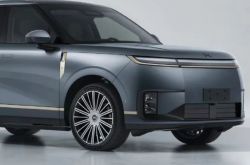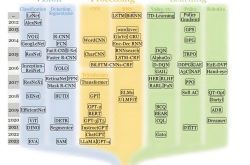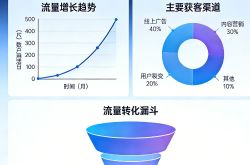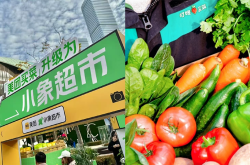Lei Jun's "Drifting" Journey
![]() 07/22 2024
07/22 2024
![]() 549
549
Lei Jun took "courage" as the theme,
Narrating the ups and downs of Xiaomi's car manufacturing journey over the past three years
At 7:00 pm on July 19th, Lei Jun, the founder, chairman, and CEO of Xiaomi Group, kicked off his 5th annual speech on time, with the theme of "courage".

Image source: Lei Jun's WeChat official account
During this 3-hour speech and product launch event, Lei Jun first spent 1 hour and 15 minutes narrating the ins and outs of Xiaomi's car manufacturing and the story of its ups and downs over the past three years. For Xiaomi's car manufacturing, Lei Jun not only learned to drive a race car but also showed a drifting video during the speech.
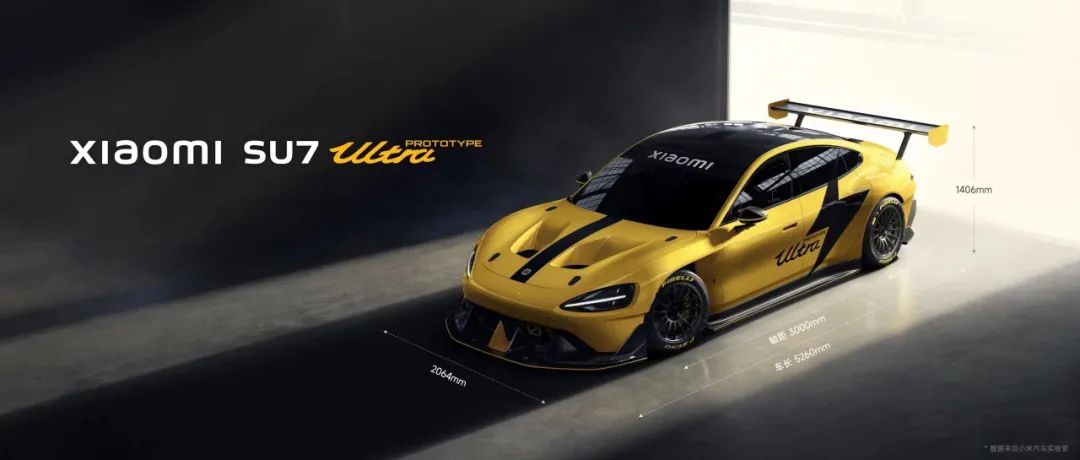
At the end of the launch event, Lei Jun unveiled the peak performance pure electric sedan born for the racetrack—the Xiaomi SU7 Ultra prototype. An even more exciting news is that this car will officially challenge the Nürburgring Nordschleife in October this year.
"More than three years ago, I stood at the crossroads of car manufacturing, feeling hesitant and torn. Back then, Xiaomi was going through a tumultuous period, beset with internal and external difficulties. Where did the courage to make cars come from, and how could we break through the encirclement? When making the final decision, I thought about it for a whole week."
Before the launch event, Lei Jun recommended a book from his bookshelf on social media—"When Greatness Was Born". "A person's belief in miracles is always the primary prerequisite for a miracle to occur." Lei Jun said that it was this sentence in the book that made him make the final decision.
"Over the past three years of car manufacturing, whenever I encountered setbacks and hesitation, I would think of those fateful moments recorded in the book, those instants when courage shone."
Hesitated, struggled, and finally found "courage"
On January 15, 2021, Xiaomi suffered US sanctions.
What should be done next? Amid the crisis, many voices suggested that Lei Jun should make cars.
Whether Xiaomi should make cars started with a special forces-style research. Lei Jun specifically mentioned two people who urged him to make cars at that time—Li Bin and He Xiaopeng. "I was also puzzled at the time, what benefits would Xiaomi's car manufacturing bring to Li Bin and He Xiaopeng."
After 70 days, visiting over 10 cities, conducting 85 surveys, interviewing more than 200 people, and holding 4 executive meetings, Lei Jun decided to once again plunge into the torrent of the times and embark on "the last entrepreneurship of his life".
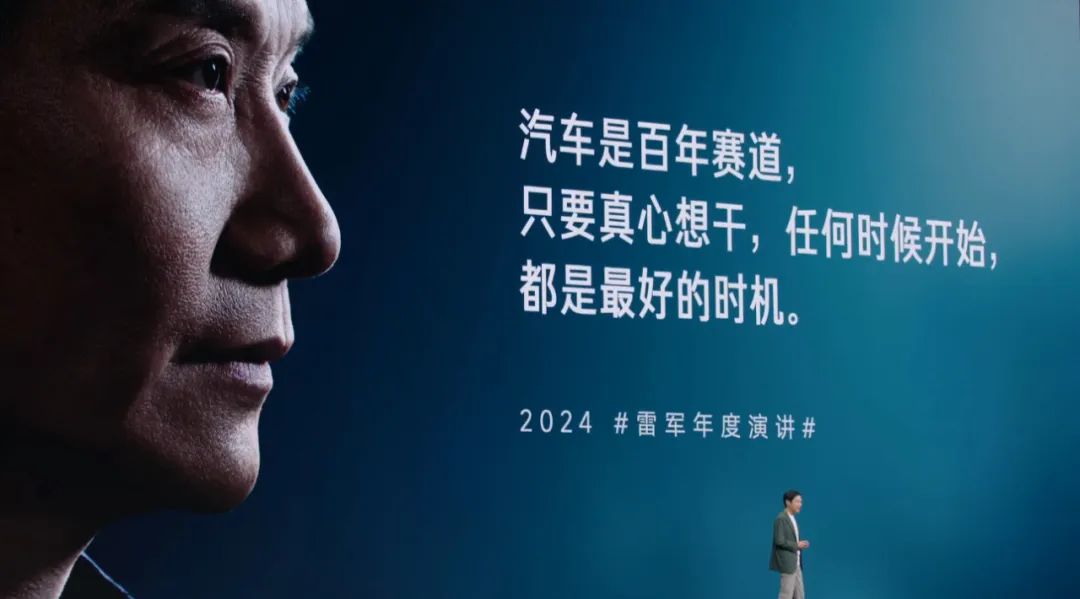
Screenshot of Lei Jun's annual speech
When Xiaomi decided to make cars, the automotive sector was already crowded with competitors. But Lei Jun believed, "The automotive industry is a century-old race, and as long as you genuinely want to do it, any time you start is the best time."
On March 30, 2021, Xiaomi announced that it had officially decided to make cars, with Lei Jun taking the lead and investing a total of US$10 billion over the next 10 years.
Lei Jun believes that to make good cars, one must love this industry. Over the past three years, Lei Jun has test-driven more than 170 cars, with over 200,000 words of notes. He even pushed himself to become a "racing driver." "So far, more than 100 members of the management team and engineers have obtained racing licenses," Lei Jun said.

Lei Jun drifting (screenshot of Lei Jun's annual speech)
Lei Jun candidly said, "Quality is very important to us for Xiaomi's first car." In December 2022, Lei Jun personally traveled to Heihe to participate in the winter testing of the vehicle. In August 2023, he went to Turpan to participate in the summer testing. Lei Jun introduced that Xiaomi's 576 prototype vehicles had traveled a total of 5.4 million kilometers in over 300 cities.
On August 16, 2023, Xiaomi's first trial production car rolled off the production line.
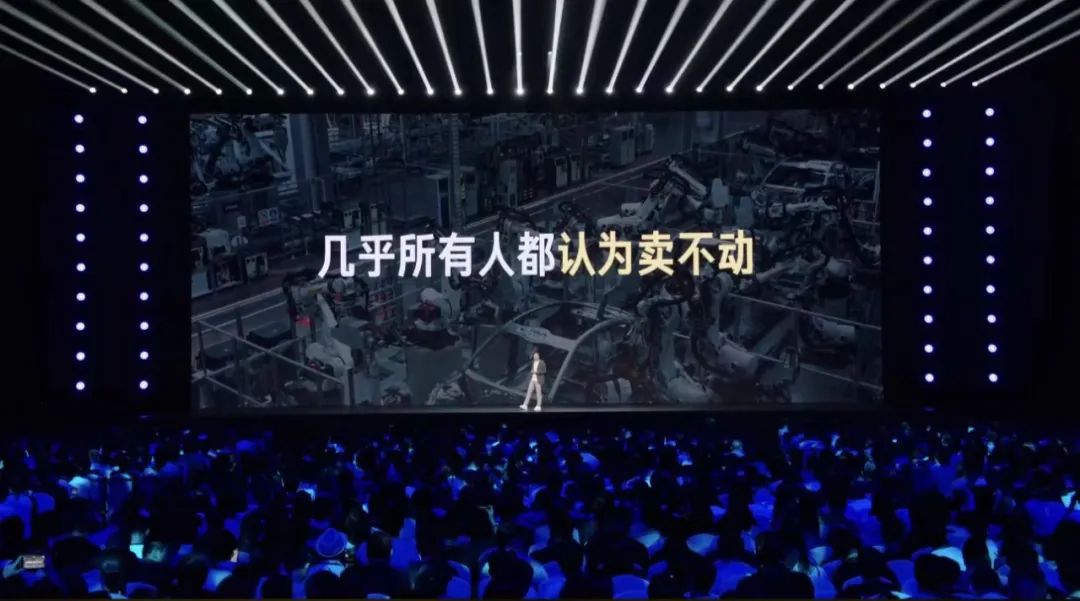
Screenshot of Lei Jun's annual speech
"Almost everyone thought it wouldn't sell well." Lei Jun still sighed when recalling the past, and the arrival of the Xiaomi SU7 seemed to be unfavored by most people.
"I was afraid it wouldn't sell well, and I was also afraid it wouldn't be enough to sell." Lei Jun admitted that after deducting the ramp-up period, Xiaomi had set a monthly sales target of 10,000 SU7s before its launch, and only the Tesla Model 3 had achieved this feat among pure electric sedans at that time.
On March 28, 2024, the Xiaomi SU7 was officially launched. Lei Jun talked about that day, "It was like a student who had studied hard for ten years taking the college entrance exam."
The initial battle was won, but what about the "staying power"?
Lei Jun said that if it weren't for the huge impact of "US sanctions," Xiaomi would never have ventured into the complex industry of automobiles, and there would be no Xiaomi SU7 today.
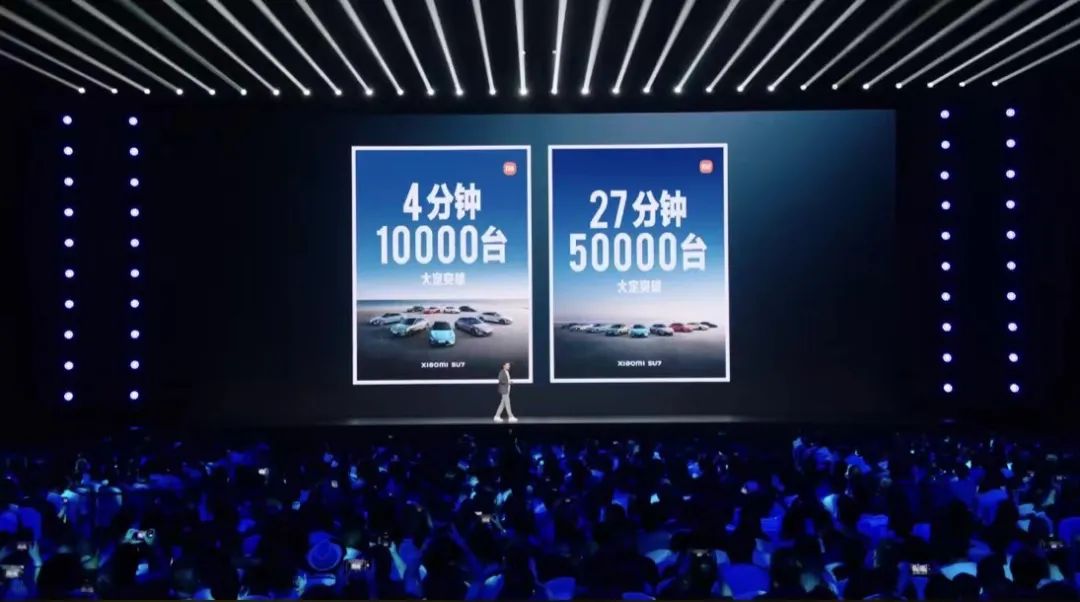
After the launch of the Xiaomi SU7, it delivered an excellent performance. It achieved an order breakthrough of 10,000 units in just 4 minutes and 50,000 units in 27 minutes.
On April 3, Xiaomi SU7 began delivery. The delivery data showed that Xiaomi delivered 7,058 SU7s in April, 8,646 in May, and over 14,296 in June, the first time monthly deliveries exceeded 10,000 units.
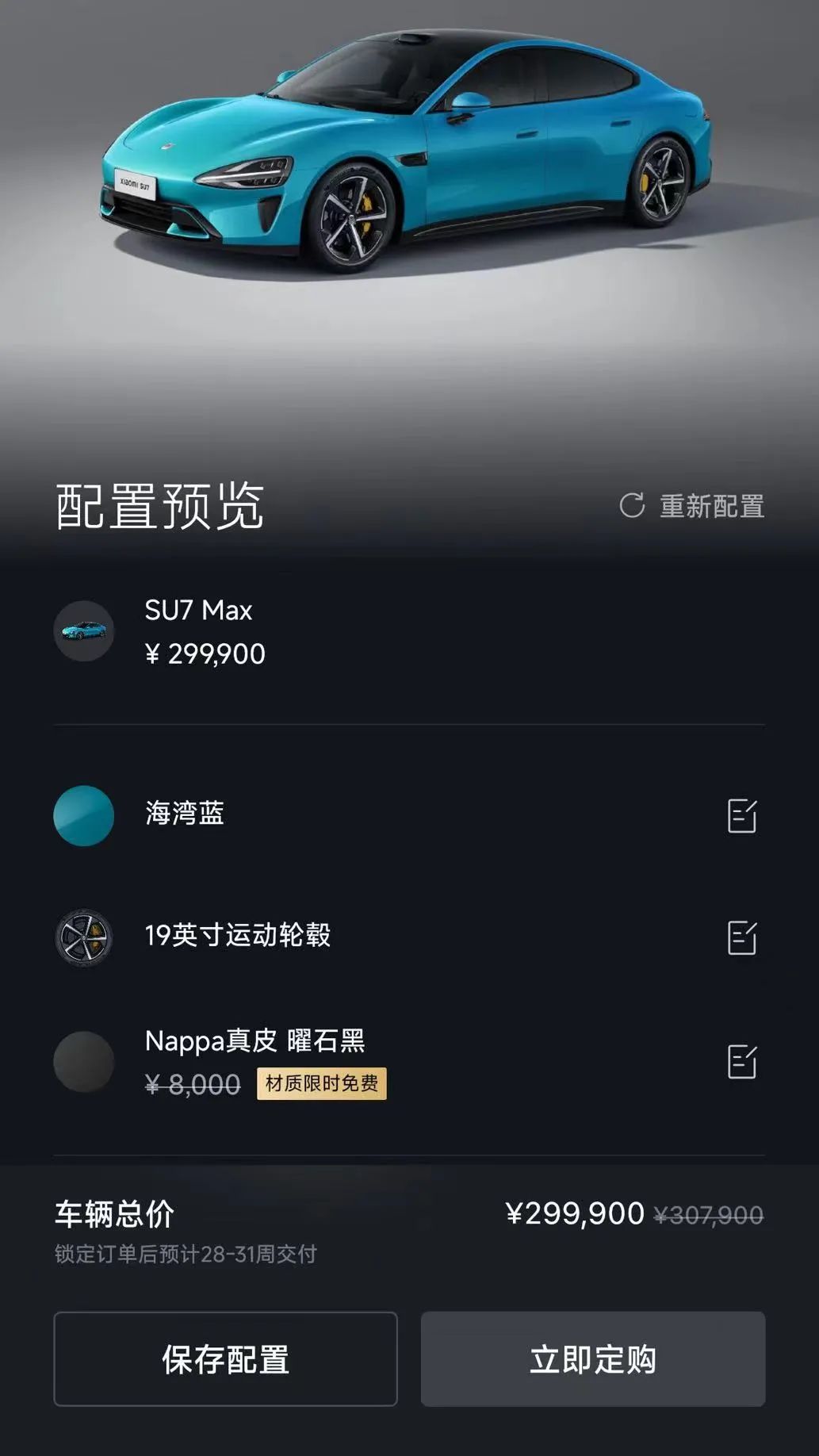
Image source: Xiaomi Cars APP
Currently, Xiaomi still has a large backlog of orders yet to be fulfilled. The Xiaomi Cars APP shows that the delivery period for different versions of Xiaomi cars exceeds half a year. The waiting period for the standard version of the Xiaomi SU7 is 26 to 29 weeks, while the Max version's waiting period reaches 28 to 31 weeks.
Xiaomi's factory is also accelerating its production pace. Located in Yizhuang, Beijing, Xiaomi's car factory, in addition to the traditional stamping, welding, painting, and assembly processes, has also built its own large die-casting and battery workshops. The factory houses 29 R&D laboratories and a 2.5-kilometer test track designed for a speed of 120 km/h, covering 18 types of test conditions. When the factory reaches full capacity, a brand new Xiaomi SU7 can roll off the production line every 76 seconds. Xiaomi Cars said that it will conduct a new round of production line optimization and maintenance in the near future to further increase production capacity. At the same time, they emphasized that the production line optimization and maintenance would not affect the goal of delivering over 10,000 units in July.
Meanwhile, the number of Xiaomi car dealerships is also increasing. Xiaomi Cars added 17 new dealerships in June, bringing the total number of opened dealerships nationwide to 87 in 30 cities; 17 new dealerships are planned for July, covering four new cities: Jinan, Changzhou, Changchun, and Guiyang.
However, it remains uncertain whether the SU7 can maintain rapid sales growth after fulfilling current orders and whether subsequent models can continue to sell well. According to the plan, Xiaomi Cars aims to ensure the delivery of 100,000 new vehicles this year and strive for 120,000.
Lei Jun previously said, "The automotive industry is extremely competitive right now, with powerful peers. Xiaomi Cars first sets its goal as being among the top three pure electric luxury sedans. Compared to sales, we are more concerned about the user experience. We hope that the Xiaomi SU7 can become the best-reviewed pure electric sedan, and Xiaomi Cars' long-term goal is to become one of the top five globally in 15 to 20 years."
Embarking on the road of "independent car manufacturing"
It is worth noting that one week before Lei Jun's fifth annual speech, Xiaomi Cars just obtained independent car manufacturing qualifications, meaning that the first batch of delivered vehicles with the "Beijing Xiaomi" tail logo will soon become "rare." In the future, "Beijing Xiaomi" will become "Xiaomi."
"Some people advised me to find a company to OEM (original equipment manufacturing) the cars," Lei Jun said, but Xiaomi's past experiences have taught him that while taking shortcuts may be easy in the initial stages, there will be many problems in the long-term development. "When starting this new venture, we decided not to take shortcuts. Xiaomi will fund car manufacturing entirely on its own and bear all the risks."
And the tenfold investment has also accelerated Xiaomi Cars' development process. On July 12th, the Ministry of Industry and Information Technology's official website disclosed the 385th batch of "Road Motor Vehicle Manufacturers and Products Announcement" new product public notices, with four "Xiaomi brand" pure electric sedans listed, and their manufacturer named Xiaomi Automotive Technology Co., Ltd.
In the 377th batch of the "Road Motor Vehicle Manufacturers and Products Announcement" issued by the Ministry of Industry and Information Technology on November 15, 2023, the applicant for the "Xiaomi brand" pure electric sedans was shown as "Beijing Automotive Group Off-Road Vehicle Co., Ltd.," and the product's tail logo was "Beijing Xiaomi."
In other words, it took Xiaomi Cars only half a year to go from relying on Beijing Automotive Group Off-Road Vehicle's production qualifications to obtaining independent production qualifications.
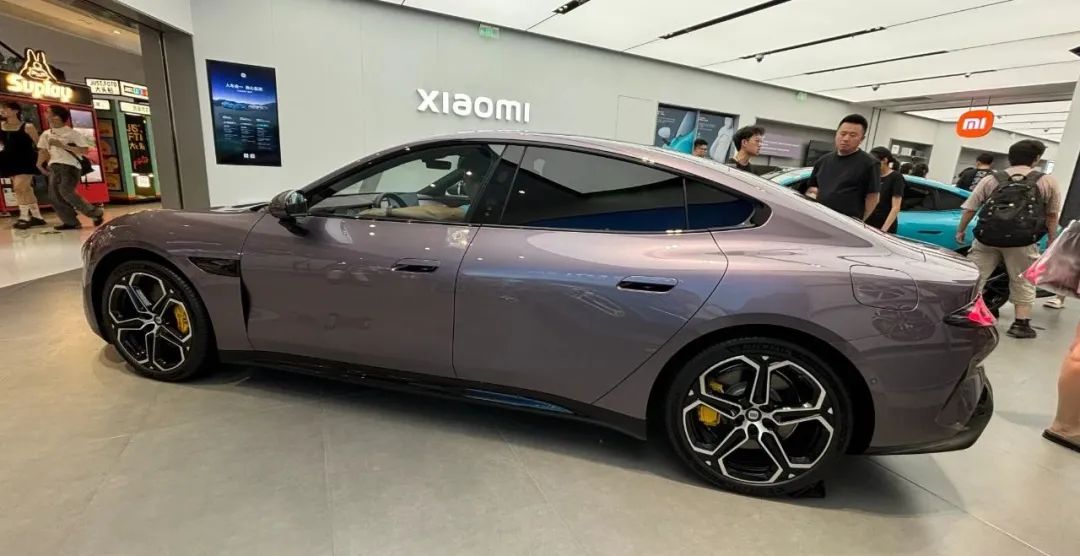
Xiaomi store at Beijing Hopson One (Photographed by Liu Shanshan)
Automotive production qualifications refer to the legal certification that enterprises must possess when producing automobiles. According to the "Regulations on the Administration of Newly-Built Pure Electric Passenger Vehicles" jointly issued by the Ministry of Industry and Information Technology and the National Development and Reform Commission in 2015, to obtain pure electric vehicle production qualifications, newly established automakers must first obtain approval from the National Development and Reform Commission for the project. After approval by the National Development and Reform Commission, the approved enterprises must also pass the relevant assessments of the Ministry of Industry and Information Technology and be included in the "Road Motor Vehicle Manufacturers and Products Announcement" to officially obtain pure electric vehicle production qualifications. Only after an enterprise has obtained the approval of the National Development and Reform Commission and passed the assessment of the Ministry of Industry and Information Technology, possessing "double qualifications," can it produce automobiles.
Generally speaking, there are three ways for new automotive forces to obtain production qualifications: partnering with qualified automakers for OEM production, acquiring qualified enterprises, or applying for qualifications independently.
Compared to the OEM model, obtaining independent car manufacturing qualifications means that the company can produce and sell cars autonomously, no longer needing to rely on other companies for OEM production. The enterprise has greater autonomy and flexibility in product development, production planning, and market strategy. In addition, independent car manufacturing qualifications may also lead to an increase in brand recognition, helping attract more consumers and build a good brand image. However, applying for independent qualifications takes longer and is relatively more difficult.
In their early stages of development, "NIO, XPeng, and Li Auto" all followed the OEM route, with Lifan Automobile as NIO's OEM partner, JAC Motor as XPeng's, and Haima Automobile as Li Auto's. However, by the end of 2023, "NIO, XPeng, and Li Auto" had all obtained independent car manufacturing qualifications through "purchases." But it is rare for a brand-new automotive brand to independently apply for and obtain production qualifications in recent years.
In recent years, China's management of new energy vehicle production qualifications has undergone a development process of encouragement-tightening-adjustment.
Between 2016 and 2018, 18 enterprises, including BAIC BJEV, Changjiang Automobile, Qiantu Automobile, Min'an Automobile, and Wanxiang Group, obtained approval for new pure electric passenger vehicle projects from the National Development and Reform Commission. Among them, 13 entered the Ministry of Industry and Information Technology's "Vehicle Manufacturers and Products Announcement" directory, obtaining "double qualifications." However, a considerable number of these "double-qualified" new energy vehicle manufacturers have not developed as well as expected, and some have even gone to the brink of bankruptcy before mass production. This has further tightened the approval of new energy vehicle production qualifications.
On January 10, 2019, the "Regulations on the Administration of Automotive Industry Investment" issued by the National Development and Reform Commission came into effect. The approval of automotive investment projects was abolished and replaced entirely with local filing management, with vehicle-level investment projects filed by provincial development and reform departments.
In the "Regulations on the Administration of Road Motor Vehicle Production Access Permits (Draft for Comment)" issued by the Ministry of Industry and Information Technology in October 2022, the previous expressions allowing the OEM model no longer appeared, meaning that the OEM model's path has also been blocked.
Xiaomi Cars' ability to obtain independent production qualifications at such a rapid pace can be said to have set a new record. Car manufacturing is not easy, but there are still enormous opportunities for enterprises that "genuinely manufacture cars and have the strength."
As Lei Jun said in his speech, "In this way, Xiaomi Cars has successfully squeezed onto the table, but I know very well that we are still far from true success, and our long march has just begun!"


